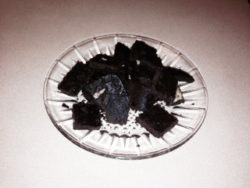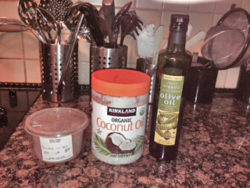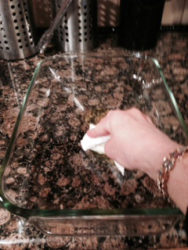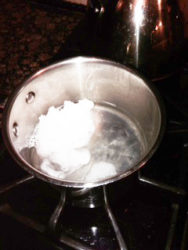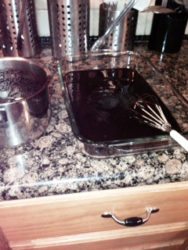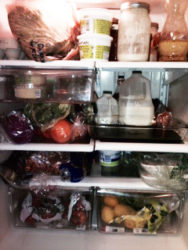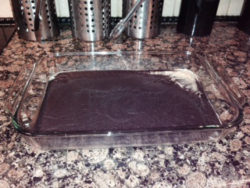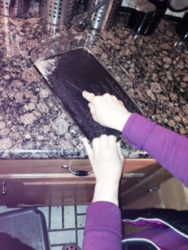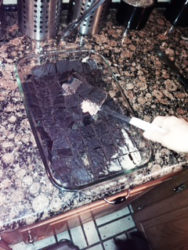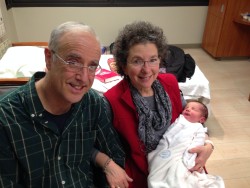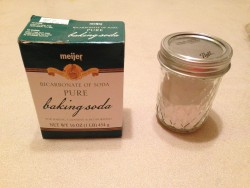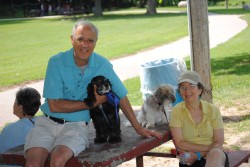Supplements for CLL
Posted by: Denise on: January 25, 2017
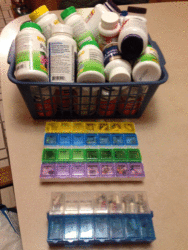
My two pill boxes. (My daily/weekly pills will not fit into one box.) And most of my pill bottles. I keep a dispensary of back-up bottles (not seen) in my cupboard.
I recently was emailed a request to update my CLL supplement list. My list of supplements is long, but not everything I take is because of CLL. I’m 61 (and a half), so like most people, I have other issues as well. I will therefore give a reason for each supplement I take.
The first is technically not a supplement. It is a glass of ACV (apple cider vinegar), lemon, and honey. To be more specific, a ‘splash” of ACV, half a squeezed lemon (or 3 tablespoons of ground whole lemon my husband makes in the vitamin with water and ice and saves in a jar in the fridge–nice hubby, eh?), and about 1 tablespoon raw local honey (we buy at farmers market or health food store). Add filtered water and stir. Drink with a straw. Rinse and brush teeth after drinking. It’s a great way to start the day!
Vitamin D3
5000 IU in the morning
2000 IU at lunch and dinner
for a total of 9000 IU.
People with cancer tend to be low in Vit D3, which we normally get from sun exposure. Mine was 19 when first tested.The goal for those with cancer is to get their vit d3 hydroxy test up to somewhere between 80 – 99. Mine has been as high as 100. Test frequently, and drop down the amount if you get too high. (I used to take 10,000, and now I’m down to 9000/day in divided doses.)
Ubiquinol
(a form of Co-Q10)
200 mg/breakfast
This is good for the heart. Both my parents have/had heart issues. I take this as a preventative. (I think it’s good for everyone, but do your own research.)
Krill Oil
667mg @ breakfast
this is the Omega 3 oil that everyone should take. Many people take fish oil. I prefer the krill. No fishy smell.
Astaxanthin
4mg/breakfast
This is one of those super antioxidants. If you take it during the summer, it protects against sun burn. (Doesn’t do the whole job, still have to be vigilant about that.) I take this one for general health.
B-17/Laetrile
500mg- bfast/lunch/dinner (total 1500mg)
This is an anti-cancer pill. Laetrile (found in apricot seeds, apple seeds and other natural parts of fruits) kills cancer cells and leaves normal cells alone. You may read that it’s dangerous because it is cyanide. Only half of that is true. The pill does act as cyanide in the body, but only when in contact with those cancer cells. I’ve been taking this dose since 2007 and I’m just fine. My source is tjsupply.
Curcumin
1000 mg/total, 500 at bfast and dinner
There are articles about curcumin and CLL, and other cancers. No side effects, and I believe this helps.
Vit E tocotrienol
50mg — just three times a week, @bfast
(I dropped to this level when I started taking the next two pills)
Vit E succinate
200 IU daily
Biotin
10,000mg daily
(The above two — biotin and Vit E Succinate — are part of a prescription from an alternative doctor to help regrow my ever-thinning hair. Not sure how well it’s working for the hair, which is doing okay for now, but my CLL numbers do well while on this also. While this is a prescription from a compounding pharmacist, both ingredients are available either at health food stores or online.)
Allicidin
one pill each day @bfast
This is a garlic extract that is supposed to boost your immune system. No icky garlic smell, small pill, but significantly more expensive than garlic pills. If you’re trying to cut costs, I’d try garlic pills as an alternative.
Olive Leaf
500mg divided between bfast and dinner
Pau D’arco
3.3 grams divided betweeen bfast, lunch, dinner
there are articles about pau d’arco being a leukemia fighter. The 3.3 grams is 9 pills/day (three at each meal) Not sure if this is a winner, but I consider it to be part of my arsenal.
Nettle Leaf
2610 mg/day (six pills total– two pills each meal)
This is another leukemia fighter. Do a search on “nettle leukemia” and read what you find. I’m committed to these as well.Neither this nor the pau d’arco are that expensive.
Digestive Enzymes
I use Life Extension. Other brands might be good. I take one/meal. As you (ahem) get older, you lack the enzymes to properly digest and assimilate (absorb) your food and supplements. I believe that my CLL came largely as a result of lifelong chronic bad digestion. Digestive Enzymes are on my must-take list.
Biosil
This is a silicon, and one of those hair-skin-nails pills I take for my beloved hair. : )
Does it work? I know my hair started falling out in sheets when I stopped it. So, despite how expensive it is, I keep it on my list.
Peak Immune
1 pill, 4X day (bfast, lunch, dinner, bedtime). This one is on my MUST TAKE LIST for CLL. I used to have problems with low neutrophils. When neutrophils get low enough, it can be life threatening. This is because neutrophils are on the front line of fighting infections. So when they tell you you won’t die of the CLL, but “with” it, it could mean you die of a secondary infection. So check your neutrophils. If the number is low, take these. I get them for $35/bottle from Vitacost, cheapest when you’re on automatic re-purchase. I’ve paid as much as $46/bottle. When you start you take 12 pills/day, and work your way down to 4/day. I take extra when I’m ill or very stressed. I believe in these. When I stopped taking them, my neutrophils tanked. When I restarted, up they went. (The medical establishment prescribes neupogen, which is not that safe, look it up.))
Amino Acid Complex
4 capsules, divided…2/bfast, 1@ lunch and dinner
These are for my low protein count. I take this both for CLL and for my hair. My protein tends to the low side, despite the fact that I eat red meat once every week or two.
Selenium
200mg @dinner
100mg @bfast
I’ve read about selenium having anti-cancer properties. I can’t really measure how well this is working for me. However, it’s on my list as I don’t take a multi-vitamin.
Calcium
250mg @dinner
Magnesium
1000mg divided @brast/dinner/bedtime
Change-o-life
2 pills/2X day (bfast and dinner)
I started it for my hair (zero effect), but it does help with energy and stamina. (Alternative doc said not to take as some of the ingredients are related to breast cancer. However, I take less than the dose recommended on bottle.)
B-Complex
Megafood brand balanced B complex
I take as directed on the bottle. Part of my multi-vitamin alternative, and was recommended for hair.
Thyroid Energy
Take 2/bfast
I take it because every alternative doc I’ve been to tells me to go back on the dessicated thyroid and I don’t want to. So I take thyroid supporting pills. These are one of them. Part of getting well means treating your whole body, not just the CLL.
Primrose Oil
2600 divided between lunch and dinner
(for my hair…again)
Iron
(ferrous sulfate)
130mg each day
I’ve had a low ferriten count which is related both to my tendency to have a low RBC and also (you guessed it) to thinning hair. So I take these every day. They cause constipation. Yup. So I take the next pill to deal with it. Works like a charm. Note: ALWAYS TAKE IRON SEVERAL HOURS APART FROM MINERALS;this means with no dairy (calcium) and no other mineral-containing supplements. This can be a challenge, and until I learned it, I had a hard time getting my ferriten score up. (I take my iron at lunch with vitamin C and other, non-mineral supplements.)
Triphala
I take NOW brand, but others are probably fine.
1.5 pills/day.
.5 at bfast, 1 at dinner
(see above) When I was taking a smaller dose of iron, I took less triphala. You have to experiment and see what works. It can take a few days till your gut settles down to business. Be patient!
Vitamin C
1000mg at bfast lunch dinner (total 3000mg)
For all around good health, and also at lunch it helps to absorb the iron. (See Iron above.)
Energyzing Iron
by Enzymatic
I take two/day at lunch, along with my regular iron pills. Not sure if this one is working that well, but afraid to stop because my ferriten is finally climbing.
Iodine
12.5mg/breakfast
this is another thyroid support item
Methyl Folate
1000mcg @bfast
recommended by two alternative doctors for general CLL support (can’t remember why) : )
Colostrum
1 pill at bfast and dinner
This is supposed to boost immune system
Elderberry
575mg @ lunch
generally supports immune system
K2/MK7
1 pill
helps coagulate blood (good for low platelets)
generally recommended to balance your vit D intake
D’Mannose
as needed for UTIs (which thankfully I don’t get much any more)
I take these when I THINK I might get one, and never travel without it!!!!
Maitake D Fractions
These mushroom pills are well touted as being therapeutic for cancer. I did well without them, but added it to my list becuase it was so well recommended.
Baking Soda
about 1/8 teaspoon in a glass of water before bed
this keeps my urine alkaline, which is supposed to be helpful for general health and for cancers
this is a cheap one! Just buy the box of baking soda in the super market and use!
(I use it for cleaning as well, instead of Ajax or Comet.)
Grape Seed Extract
@ bfast and dinner
also good for general health
Zinc
1 pill, bfast and dinner
part of my multi-vitamin set
Betaine HCL
This another digestion booster. The HCL is for hydrochloric acid. Some bottles say to take AFTER meals. I take it with meals, or eventually I forget to take them. When I stopped for six months, my dental visit showed more plaque. So apparently it breaks down plaque and other ickies in our digestive system. Worth a try, I think.
Hemp Protein Powder
5X/week with my breakfast smoothie
take as directed on bottle,
I’m trying to avoid dairy, as it causes congestion.
So this about sums up my daily pills. There are others I take, as needed. Bromelain (pineapple extract) for pain and inflammation. NAC and ALC for my Menieres, as needed. There may be more, can’t think of them now. Please feel free to post any questions on this post and I promise to answer asap.
To your good health!
CLL Alternative Healing
Posted by: Denise on: November 20, 2015
This is a guest post by Eric Clark, a Canadian who was diagnosed in 2012.Â
CLL Came to Visit
Although I am not a shy person, I have been reluctant to post any good news on the two CLL Facebook groups because they only talk about the medical aspects around late stage treatment. The guy who started the one in Canada warned me not to be fooled by any stories about green tea and the like.
The ‘anomaly’ showed up in routine blood work in August, 2012. My GP is friendly but not very helpful. When I met the specialist that Fall – this hematologist is young, female, overweight – I found her much more open to discuss health – but I only see her once a year. (She has since lost weight and clearly cares about her health). She did accept my suggestion of blood work every quarter since I want to monitor this more closely to assess the effects of my own efforts. The official stance of ‘watch and wait’ for early stage Chronic Lymphocytic Leukaemia tries to have you ignore the threat and come back in a few years when there is something to medicate. I have been proactive about my health for many years so I can detach from this attitude and get on with improving life.
For the first year – summer to summer – I took stock of my life and expressed gratitude more often for all the good things I enjoy in life. I began to tighten up a number of routines and clean up some issues that needed attention. My wonderful wife, Lia, really rose to the challenge. We shared more guided meditations, personal treatments and she prepared the best healthy food for me. I love our home in the country where we have real darkness at night as nature intended, true quiet broken only by the sounds of birds, animals and insects, as well as fresh air and water. I have failed to identify with this diagnosis but accepted the challenge to rise to a higher level of health.
In the second year, I focused on getting toxic people out of my life. This was a tougher realization than expected because I had attracted them or engaged them. It was all about me. They are mostly unaware of, or indifferent to, this change.
In the third year, I added an intense focus on supplements to give my body the best chance to improve its defenses and support more exercise. At this point, I had still not met another person with the same diagnosis except the online crowd discussing research, variations of chemo for later stages of CLL and the inevitable nasty side effects. I have avoided bringing my story or ideas for health to those Facebook groups. (More to come in a following post.)
Eric Clark – Oct. 2015 – strategy9@icloud.com
CLL ~ Going Wheat-Free Part 2
Posted by: Denise on: November 5, 2015
Here is a second post on going wheat-free (and more) by fellow CLL-er, Eric Clark.
My First Quarter experience with a Wheat-Less lifestyle
In mid-June of this year, 2015, I decided it was time to read Wheat Belly and asked to borrow it from my good friend, John. I convinced myself that buying the book was too much pressure that might actually influence me to make some changes. Aren’t these mind games funny!? While reading the first chapter of Dr. William Davis’ first book, I got very engaged and decided he knew what he was writing about. I liked the fact that he is a cardiologist, not just a frustrated GP who decided to write a book with general health guidelines. This a hard-hitting indictment of medicine, public health, and various disease-centered organizations as well as the food and drug industries. It highlights solid research that has been ignored or buried deliberately.
Weight loss was not my focus but rather the many other possible benefits with respect to the chronic conditions that are too often described as the inevitable outcomes of the aging process. I began to journal various things that I noticed including the following:
*****************
In the first two weeks:
- a skin tag in my right armpit got very active after being dormant for years – it fell off!
- Lia mentioned that I no longer had restless legs at night – not kicking anymore
- torn rotator cuff (of two years) in my right shoulder about 80% improved
- tennis elbow on the same side improved about 70%
- no cravings at all – good energy all day
- lost 6 lbs. – belly shrinking
Second two weeks
- feeling quite joyful and did not connect this until later – naturally elevated mood
- my chronically runny nose stopped dripping
- body odor gone
- lost another 4 lbs.
Second month – mid-July to mid-August
- enjoying a wide variety of fresh foods – everything tastes better
- hungry for less food per day than in the past
- noticing more in nature on my bike and in my kayak
- lost another 5 lbs.
Third month
- lots of physical energy – helped friends move – 8 hours of hard labour
- decided to discontinue statin drug
- lost 5 more lbs. – total of 20 in 3 months – 11% of starting weight
****************
My experience to date has cost me no money at all, perhaps it has even saved some.
I don’t feel like there is any reason to stop and revert to any former choices. I am still reading the second book – Wheat Belly – Total Health – and have the companion cookbook too. Lia is so good at this that we have not used any of those recipes yet. Most people are looking for substitutes for familiar, comfort foods like replacing cereal, toast, desserts, etc. so it can be helpful, especially to share with other family members who are not as committed to this way of eating. I have not had any restrictions in the quantity of the many lovely foods available – my body seems to know when it is satisfied.
The larger message is not just about wheat but rather about grains in general and how undigestible they really are; hence they lend themselves to more processing than other foods. I chose to give up wheat, rye and barley at first. Then I quickly added corn and oats to the list based on understanding more of what is really going on in my body. Remember to focus on your own motivations and enjoy your own benefits which might be quite a different list than mine. My longer term goals are to prevent bone loss and dementia which are hard to tackle if you start too late. I have watched in my family how these two conditions completely change a person’s lifestyle and former enjoyment in doing so many things in their later years.
Congratulations for considering this approach to improved health and for sharing my adventure.
Yours in health.
Eric
Eric Clark – strategy9@icloud.com
CLL and the Wheat-Free Diet
Posted by: Denise on: October 28, 2015
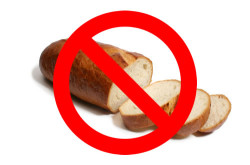 This is a guest post by Eric Clark, a fellow CLL manager who has graciously offered to write on his like-minded thoughts for this web site:
This is a guest post by Eric Clark, a fellow CLL manager who has graciously offered to write on his like-minded thoughts for this web site:
Wheat-Less Wisdom – #1
As Humans – Homo Sapiens – we have evolved uniquely over the past 2.5 million years distinguished initially by our use of fire to cook meat. For most of that time we moved around, on foot, looking for and chasing our food. We did not eat three meals a day and often had very little food for a few days at a time. Our ‘snacks’ were berries, nuts and wild vegetables(tubers) while hunting for fresh meat. Eating the seeds of grasses – what we call grains – was a desperate measure in times when starvation threatened. We have only done this for 10,000 years, just 0.4% of our recent evolution!
Eating is an expression of individual survival. Sharing meals is a culturally-rich activity. Food is an emotional topic. Our choices are rarely based on true health science. When one decides to return to wheat-free living, it can be a very lonely choice. Institutions in key areas such as medicine, public health, education and the media do not support this choice. In fact, they seem to argue against it. And the many organizations that have formed around various major diseases have all determined that ‘healthy whole grains’ represent an essential component of healthy living.
During the past 50 years grain consumption has increased, as have a long list of degenerative conditions. The science that has demonstrated the direct link between the two has not been featured in a way that would seriously challenge this mass consumption of a food source that is more suited to 4-footed grazers with very different digestive systems. A study of various indigenous peoples around the world reinforces what science has discovered and yet we rarely learn from humans who are considered less ‘advanced’ than ourselves. Although we can boast to be living longer than even our recent ancestors, our quality of life may be severely compromised by several conditions that are described as ‘normal aging’. There is no easy justification for conditions that are occurring earlier in life such as obesity and diabetes.
Our so-called health care is really a disease management system which too many have come to rely on as their quality of life declines. The focus is on finding ‘a cure’ rather than addressing the contributing factors that are within our control. To some, the idea that our basic diet may be the culprit is just too simple to be the answer to these complex conditions. We have handed over our power in other ways so how could we know better than the brightest minds in medicine and food science? Is this just an excuse for not trying something as simple as a dietary change for a few weeks? As that famous line from Pogo says, “ We have seen the enemy, and the enemy is us! †Eric Clark – strategy9@icloud.com
Alkalize for Health with CLL
Posted by: Denise on: August 15, 2015
I’m really big into lists. But sometimes I think it’s best to focus on one good thing at a time. And one good thing you can do for yourself is to alkalize. There is a lot of information out there about what to eat in order to keep your body alkaline and therefore more healthy. Livestrong has an article on just this topic.
Ironically, some of the acidic food we eat or drink can make us more alkaline. For example, vinegar is acidic, but is recommended for maintaining alkalinity. This can be confusing, but don’t let it get in the way of working towards alkalinity. In general, if you eat mostly vegetables, either raw or lightly cooked, along with your animal and vegetable proteins, you are encouraging your body to be alkaline.
To test your body for alkalinity, purchase some test strips either from your local health food store or online. Do a quick search and you will find them. We’re supposed to keep our body somewhere at 7 for optimal health. It’s recommended to test your morning urine for an accurate count. Follow the directions on the package. You can either dip the strip into a cup or your urine, or place the strip in your urine stream. Either way, quickly compare the color of the strip to the chart that comes on the package to get your reading. Do this for several days to get an accurate picture of your alkalinity.
Even with a healthy diet, you might find you need a boost to maintain alkalinity. What I’ve found very helpful it to take about a quarter teaspoon of plain old generic, bought-in-the grocery-store baking soda in a glass of filtered water. I take this just before bed with my enzymes, and once again first in the morning. Be sure to measure your first morning urine to see if this is working for you. Over time, you might not need to measure this all the time. But it’s good to check it once and again to make certain you’re maintaining your alkalinity.
Is this what is keeping me well? I believe it is one of the many things I do that maintains my good health. It’s easy, it’s unbelievably cheap, and as far as I know it can do no harm. An added side benefit for women above a certain age… no more pesky nighttime hot flashes. That’s worth taking it all on it’s own!
To your good health and alkalinity!!!
Promising Conventional CLL Treatments
Posted by: Denise on: June 11, 2015
First, I have to tell you that I’m normally pretty anti- any kind of conventional cancer or leukemia treatment.  That is, unless there is a proven record of success, measure by CURE!!!  Much of the chemo treatment has abysmal results.  The researchers, and the medical establishment in general, measure the extension of increased lifespan in MONTHS.  Read the research for yourself.  If you can.  It’s very depressing.
So when I tell you that some of the new information out there is promising, I truly mean it.  They  (“they” being the conventional ones out there) are working on ways to get those of us with CLL well.  This is a new concept.
The first took place at the University of Pennsylvania.    Check out this link: http://www.uphs.upenn.edu/news/News_Releases/2011/08/t-cells/
CLL WBC — Lower by Eating Only Raw or Lightly Cooked Foods
Posted by: Denise on: June 11, 2015
Question:
My White Blood Count (WBC) has never gone done and in fact always been increasing. To me that’s the real indicator. This abnormal and steady increase has crowded my arteries and I have trouble even going for long walks. Specially, where we live there are hills in our neighborhood and it’s a huge battle to get back to the top. I must say, I am not overweight and used to regularly exercise (jogging, etc.). Something I terribly miss now.
The two herbs I am currently trying which seem to help me the most are: Pau de Arco (Taheebo tea), and Astragalus. Especially the latter which I take in liquid drops form (from Wholefoods store) seems to give me enough energy to get through the work day. Do you do anything to decrease your WBC?
Answer:
There are a few things that HAVE worked, but they just haven’t gotten me all the way well. Â For the WBC (which we’re supposed to watch so closely) the very best that I’ve done is to go on a non-burnt diet. This means that I do cook food, and I even eat meats, chicken etc. (not to excess, but I eat them) but…I always slow cook and never, never eat anything browned, grilled, etc. I just abstain from eating if that’s all that’s available. Â My highest WBC was 47, and now I’m in the low 20s and holding for over a year. I started in January 2013 and have been holding steady since. I will not experiment with trying the burnt food again, that’s how positive I am that this was an important factor. Now the low 20s still means that I have CLL (the diagnosis; I try not to own the actual CLL : ) Â But this has been an important change, at least for me. In my previous life I LOVED burnt food, ate the burnt potato chips, liked grilled meats with burnt fat, carmelized onions, you name it.Â
How to do this: I make soup and stews every week, and then we eat the leftovers. It’s very efficient and makes it easier to not be cooking so much every day. After the initial dinner, we have the meats (chicken, beef, etc.) for lunch only along with fresh, raw vegetables, and try to have vegetarian dinners, sometimes with fish. Also I eat eggs several times/week. Either poached or very slow-fried (so there’s zero browning).
The other thing I would suggest is getting an infrared sauna. Â Look into the Thersauna and the Clearlight; they are the two with low EMFs. Â I’ve had no experience with this yet, but several, many people with CLL have reported to me personally that this always lowers their WBC. I’ve been late in getting one, but it is on my current to-do list. It’s expensive, but (as Hessel Baartse would say) it’s cheaper than a funeral. Love the gallows humor.
There is more, much more. And I will be delighted to share with you. Also, the ray of hope is that “they” now are coming up with non-chemo solutions, so even if you have to go conventional, it is no longer a death sentence. (It’s still my goal to never go conventional, but it’s nice to know that it’s an option.)
I hope this gives you something to chew on (not burnt!).Â
